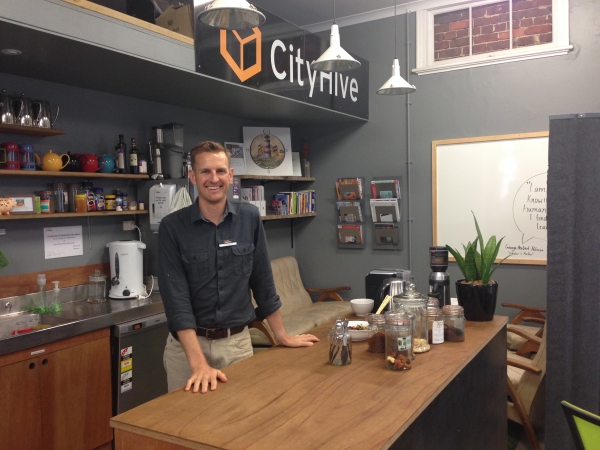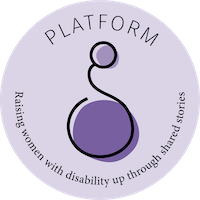In Andrew’s words…
Who/what inspires me: Great questions; expressions of revelation, accountability, appreciation; community; and the founders and other practitioners of Cheng Hsin and Apithology.
Best advice: Don’t be a shit-talker if you can’t back it up.
As founder and executive officer of the social enterprise Pollinators, Andrew Outhwaite has been conducting an elaborate social experiment. Five years ago he asked himself “what are the conditions enabling of healthy, resilient, sustainable human communities?” Intrigued by the possible answers, he decided to dedicate 10 years of his life to one geographic community to try to determine the answer. The result of that experiment is Pollinators – whose vision is to make the City of Greater Geraldton in regional Western Australia be globally recognised as a model for sustainable communities by 2020.
Andrew is no longer conducting the experiment alone. He has gathered a network of people who are similarly intrigued by the answer. Together they have built Pollinators into a viable business model run by a board of eight, that employs two full-time positions and dozens of contractors, has a paid membership of 160 individuals and groups and has provided networking, training, co-working spaces and more to hundreds of clients.
But how did Andrew come to pose such a question in the first place? Why did he choose Geraldton for his experiment? And is the experiment working?
What are the conditions enabling of healthy, resilient, sustainable human communities?
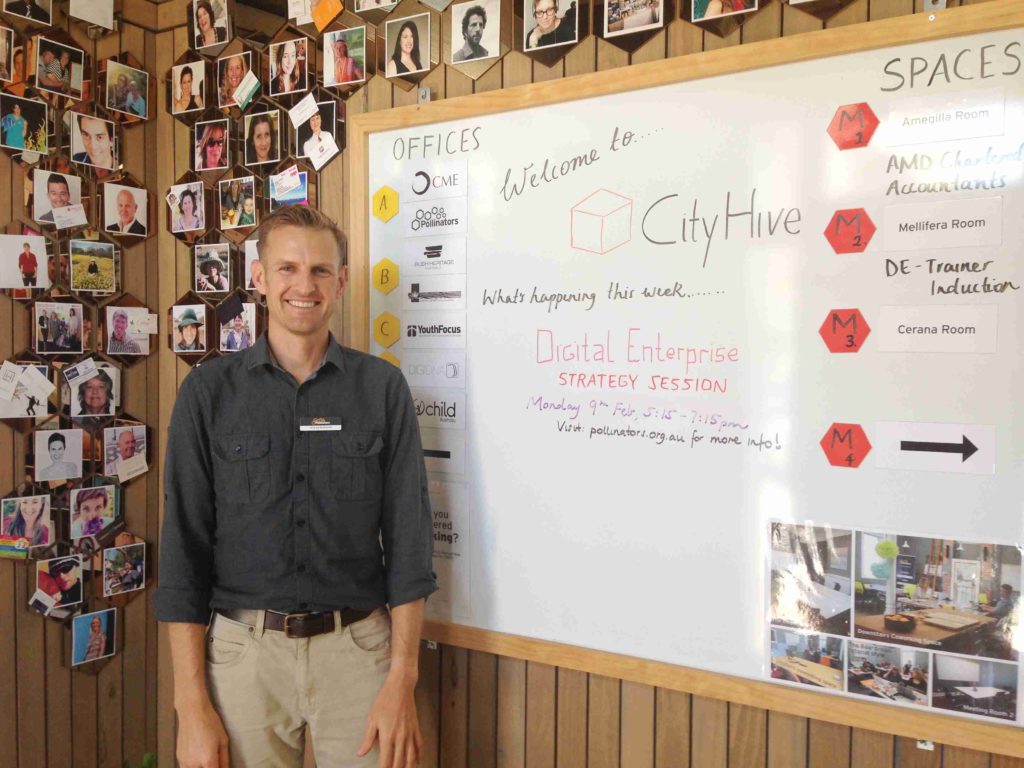
Seeds of inquiry
Sitting in the Pollinators’ lobby today, surrounded by exposed brick walls holding shelves adorned with books on leadership strategy, business modelling and social innovation, Andrew ponders how he came to conceive the idea of Pollinators. He considers each sentence carefully, his sharp mind analysing how to best express himself and his often elaborate and philosophical concepts. A mix of members at the coffee machine nearby – a pregnant woman, a business man, a hippy-looking type – don’t distract him in the slightest. For this is a man on a mission. And nothing interests him more than seeking answers to better himself and his world.
For Andrew, his inquiry into sustainability blossomed after taking on a job as a Coast Care officer in Geraldton. While he’d already joined a groundswell of change in Perth by lobbying with environmental and community advocacy groups while studying marine science at university, the Coast Care job further stirred his inquiry into what makes a community truly sustainable. So taken was he with the idea of sustainability that Andrew determined to find where on earth someone had tried to create a sustainable community and learn from what they’d done.
…Andrew determined to find where on earth someone had tried to create a sustainable community and learn from what they’d done.
Immersed in sustainability
So it was that in 2005 Andrew found himself in the small city of Karlskrona in Sweden studying a Masters in Strategic Leadership Towards Sustainability. Here, by forest-cloaked countryside and island-studded seas, Andrew directed his keen intellect towards the question of sustainability. “It was brilliant,” Andrew recalls. “It was a year spent with 50 or 60 other people who were from Rwanda, Canada, Sweden, the UK, Spain, Turkey and all equally passionate and engaged about the same topic. We were in a small town, it was isolated – all we had to do 24 hours a day for the better part of the year was figure (out sustainability). So that’s all we did all day.”
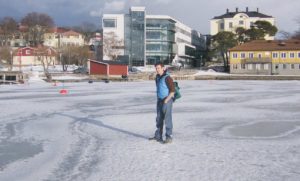
It was during this year that Andrew had an epiphany. “I realised that, hang on, couldn’t business just be for good?” he says. “Instead of having to rely on natural resource management groups to clean up after them, or environmental groups to partner with them to generate shared value, couldn’t they just do good – good for their customers, good for the planet, good for the communities that they exist in?”
“And so I got very interested in the concept of social enterprise. London at the time was the most far progressed in terms of social enterprise. I was full of confidence and enthusiasm and ridiculously bold but basically called up all sustainability consultancies and anyone in sustainable enterprise and asked them for a job.”
“I realised that, hang on, couldn’t business just be for good?”
Social enterprise revolution
It wasn’t long before Andrew was experiencing his first taste of sustainability in relation to the corporate world, as a project manager and consultant for a finance company. In his job, and while consulting on the side, he became swept up in a movement that was pushing new barriers for social enterprise – where corporates really were working to do the good that Andrew had dreamed of. He joined initiatives such as the Spark Challenge to solve homelessness. Big business put up prizes in a competition to solve this major issue. “All these amazing businesses and not-for-profits came out of the woodwork running (programs like) bike recycling for ex-prisoners, organic dairy farming for ex-drug addicts,” Andrew says.
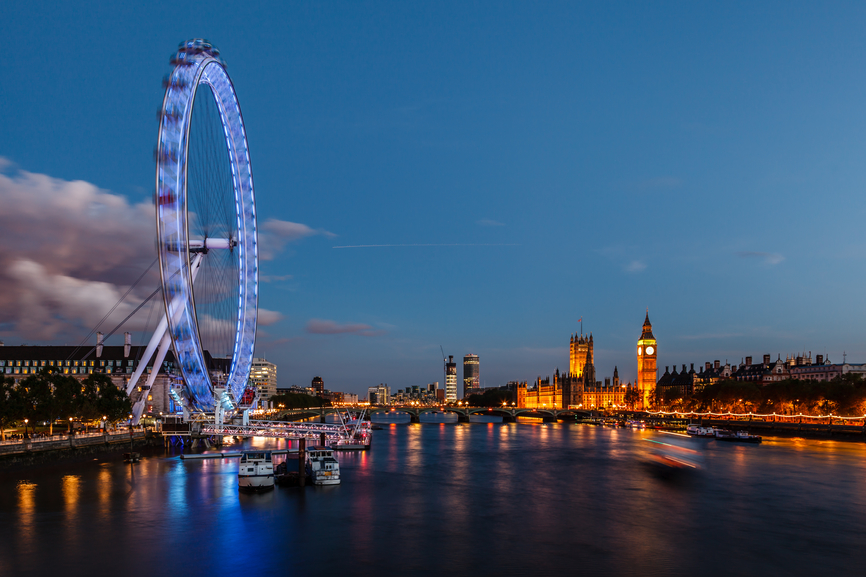
Living and working in inner-city London, riding his bike to work and revelling in the city’s carnival of cultural offerings, Andrew found himself exposed to a new world – a world where people shared office space as co-workers, where sustainability meant something and was not just a word bandied about on media releases and annual reports, where entrepreneurs were directing their passion and talents not simply towards making money but how to do good. While the concept of social enterprise was in its infancy elsewhere, London was leading the way. And Andrew was at the forefront of the revolution.
Andrew found himself exposed to a new world – a world … where entrepreneurs were directing their passion and talents not simply towards making money but how to do good.
But, typical of his highly conscious and considered nature, Andrew did not simply kick back and revel in movement but instead constantly questioned if the work he was doing was making a real and lasting difference. He realised that, while the projects made great inroads, they were mostly on a project by project basis – the long term results were never revealed. He questioned how such work could make a difference in the longer term. And, ultimately, he decided to head home to Australia in search of an answer.
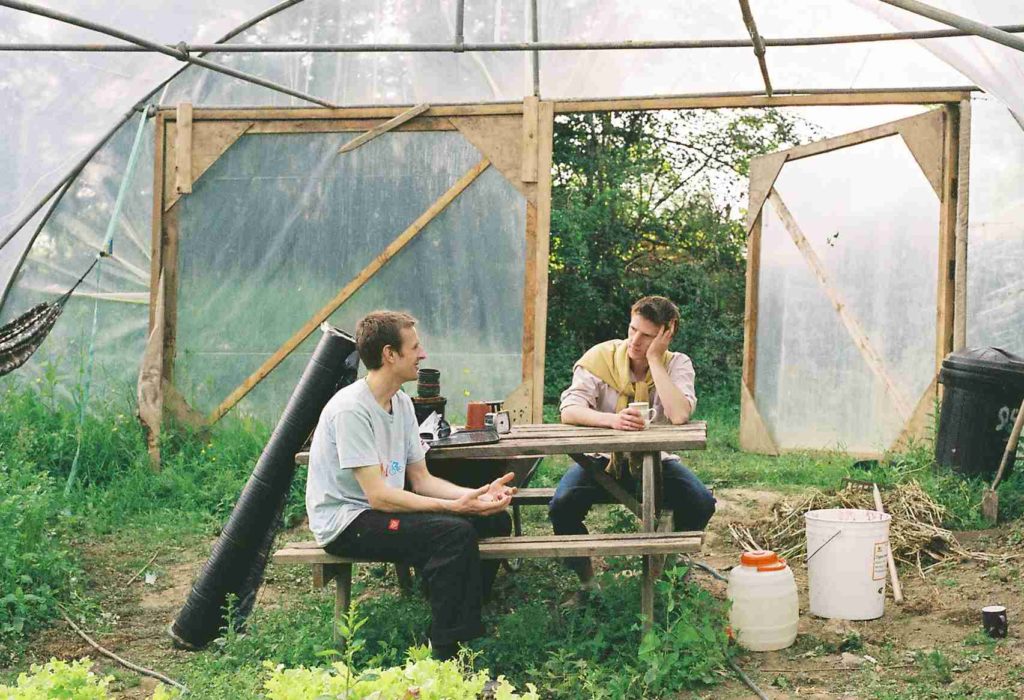
Choosing a community for change
While Andrew had been in London he’d been diligently measuring his carbon emissions in a bid to reduce his own carbon footprint on the planet. He monitored items in his shopping basket, bus trips, electricity usage in such detail that he logged how many tonnes of carbon he had produced. So it went against his very being to emit masses of carbon on a flight home. The answer? An overland journey.
On the three-month journey home, much of it spent sleeping in train carriages, he pondered his core question? “What are the conditions enabling of healthy, resilient, sustainable human
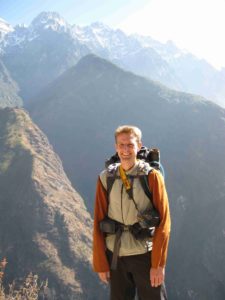
communities?” He determined to choose one community, and stay there for a decade to see if he could find the answers.
But which community should he study? He wasn’t interested in places like Byron Bay and Newcastle which were already on the path towards sustainability. It had to be small enough that people knew each other. It needed a supportive and proactive local government, a diverse and reasonably wealthy local economy. And it needed to be at risk of damage from climate change or other global forces. He came up with a shortlist and began researching each place. Near the top of his final list was the city of Geraldton, where he’d earlier worked as a Coast Care officer. When a job as a senior environmental and sustainability officer came up at the Geraldton council, the decision was made – Geraldton would be the site of his 10-year inquiry.
Geraldton would be site of his 10-year inquiry.
Time ripe for change
During his two-year post at the City of Geraldton Andrew came to realise that, while the local government was doing a lot to promote and foster change, and people had great ideas, the community didn’t have the capacity to make real change happen. People didn’t have the knowhow to launch social innovations, to support those with ideas, to hold public institutions to account.
Through his work facilitating workshops, engaging the community and developing environmental strategies, Andrew realised there were hundreds of people who had great ideas or passions, but felt they were alone and unable to act. The time was ripe for serious social change. And he saw potential for the development of a social enterprise that was also a successful business model.
…there were hundreds of people who had great ideas or passions, but felt they were alone and unable to act.
A venture is born
Andrew had saved money during his two years back at the City of Geraldton and was ready to launch the main part of his social experiment. He gathered a network of like-minded people around him and together they began organising networking events in an effort to connect like-minded people. People would gather for Friday morning coffee and networking sessions and here the seeds of change were sown. As the events grew in popularity, the volunteer Pollinators team became incorporated in 2010 and formed a board.
All the while Andrew earned a living through environmental consulting. But by 2013 it became clear that Pollinators had real potential to not only promote positive change, but to be financially sustainable itself. Andrew stepped down from the board and took on a paid part time role as executive officer.
It wasn’t long before Pollinators had moved to its own dedicated premises, CityHive, in the process revamping a historic building, beautifying a near-abandoned laneway and breathing new life into a tired end of town.
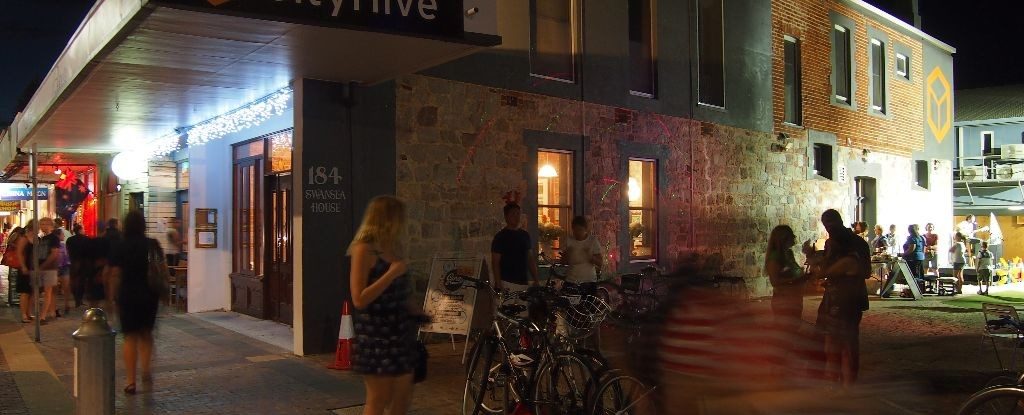
Acting on the premise that nurturing innovations and entrepreneurs can create healthy, resilient communities, Pollinators offered co-working spaces. They built a community of members who come together for regular networking events, they launched training programs to provide people with the skills to start new businesses and social ventures of their own. There were pop up markets, start-up weekends, ‘Goodness’ Festivals celebrating sustainable enterprise.
Despite the success and growing momentum, Andrew and the Pollinators board remained sceptical. “For the most part, especially for a pretty smart, experienced, sceptical board – we were all highly sceptical this would work,” Andrew says. “We were in the business of doing a deliberate, conscious, social experiment. This is a trial to see if this method of organising and this sort of model could contribute to a community making a sustainable transformation in the course of a decade.”
Reflection
So, five years into the 10-year experiment, is it working? Is Pollinators helping to transform a community? Considering the question Andrew moves his lean frame forward, his eyes alive, and seems almost surprised by his answer. “Yeah it is,” he says. “Exactly how it’s working changes. At first it worked because there was a lot of enthusiasm, people were excited about meeting each other, there was enthusiasm about hanging out with like-minded people. As we’ve grown the (co-working) space side has grown as a business model. Training sessions are having an impact. Now we are now delivering digital training or running accelerator programs.”
Pollinators now offers five private offices and 20 co-working spaces, digital training to not-for-profits and small businesses, the Catalyst training program to help people looking to launch new ventures, a mentoring program, Flock, in which new ideas are nurtured, regular networking sessions and regular training events.
And word is spreading. Other communities are calling, visiting, wanting Pollinators to share what it has learned. While Andrew is the first to admit he’s uncovering more questions than answers about what enables sustainable communities, he’s keen to share what he has learned. “If I’ve gained even the tiniest bit more wisdom about communities, sustainability, and that’s of help to others, then I’m very, very happy,” he says.
Other communities are calling, visiting, wanting Pollinators to share what it has learned.
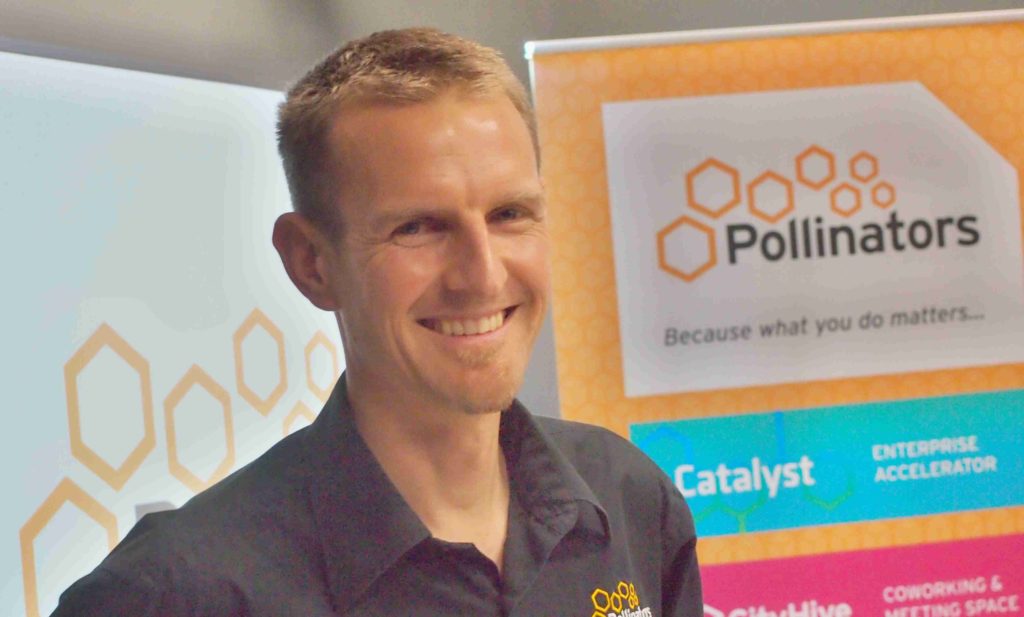
Get involved…
For more information on Pollinators visit the website www.pollinators.org.au.
To read Andrew’s personal blogs visit his website www.andrewouthwaite.com or www.flowingmu.wordpress.com

